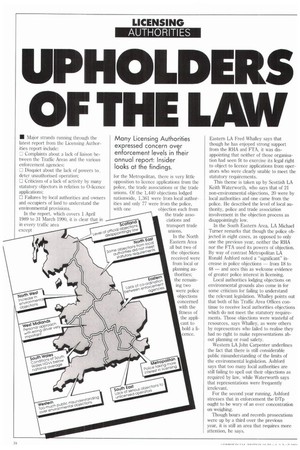UPHOLDERS OF THE LAW
Page 26

If you've noticed an error in this article please click here to report it so we can fix it.
• Major strands running through the latest report from the Licensing Authorities report include: E Complaints about a lack of liaison between the Traffic Areas and the various enforcement agencies; • Disquiet about the lack of powers to deter unauthorised operation; O Criticism of a lack of activity by many statutory objectors in relation to 0-licence applications; O Failures by local authorities and owners and occupiers of land to understand the environmental provisions.
In the report, which covers 1 April 1989 to 31 March 1990, it is clear that in in every traffic area except for the Metropolitan, there is very little opposition to licence applications from the police, the trade associations or the trade unions. Of the 1,440 objections lodged nationwide, 1,361 were from local authorities and only 77 were from the police, objection each from with one the trade associations and transport trade unions.
In the North Eastern Area all but two of the objections received were from local or planning authorities; the remaining two were police objections concerned with the fitness of the applicant to hold a licence. Eastern LA Fred Whalley says that though he has enjoyed strong support from the RHA and FTA, it was disappointing that neither of those organisation had seen fit to exercise its legal right to object to licence applications from operators who were clearly unable to meet the statutory requirements.
This theme is taken up by Scottish LA Keith Waterworth, who says that of 21 non-environmental objections, 20 were by local authorities and one came from the police. He described the level of local authority, police and trade association involvement in the objection process as disappointingly low.
In the South Eastern Area, LA Michael Turner remarks that though the police objected in eight cases, as opposed to only one the previous year, neither the RHA nor the FTA used its powers of objection. By way of contrast Metropolitan LA Ronald Ashford noted a "significant" increase in police objections — from 18 to 48 — and sees this as welcome evidence of greater police interest in licensing.
Local authorities lodging objections on environmental grounds also come in for some criticism for failing to understand the relevant legislation. Whalley points out that both of his Traffic Area Offices continue to receive local authorities objections which do not meet the statutory requirements. Those objections were wasteful of resources, says Whalley, as were others by representors who failed to realise they had no right to make representations about planning or road safety.
Western LA John Carpenter underlines the fact that there is still considerable public misunderstanding of the limits of the environmental legislation. Ashford says that too many local authorities are still failing to spell out their objections as required by law, while VVaterworth says that representations were frequently irrelevant.
For the second year running, Ashford stresses that in enforcement the Dip ought to be wary of an over concentration on weighing.
Though hours and records prosecutions were up by a third over the previous year, it is still an area that requires more attention, he says.
















































































